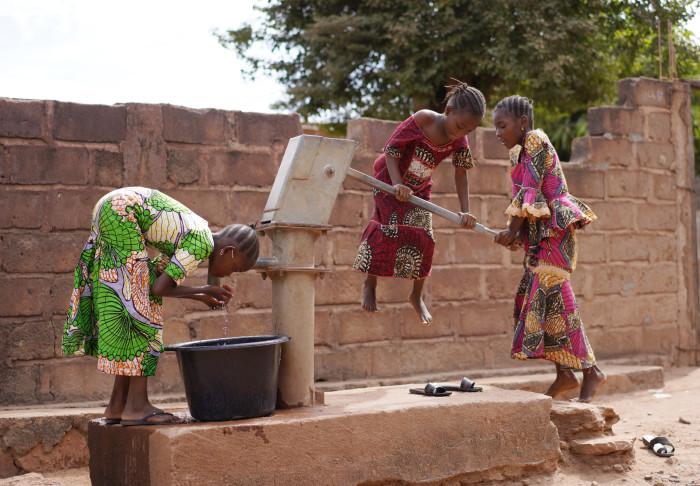Mapping Global Resources Fragility: The Water-Energy-Food Environment NEXUS
by Anna Freeman

The Food and Agriculture Organization has joined forces with the Centre for Environmental Policy to map natural resources-driven fragility.
The Food and Agriculture Organization of the United Nations (FAO) has joined forces with the Centre for Environmental Policy, Imperial College London, on an ambitious project under the Building Forward Better Initiative aiming to develop a tool for the mapping of natural resources-driven fragility, the global fragility based on integrating the availability of natural resources with future technological and environmental issues.
The FAO Building Forward Better Initiative
The "Building Forward Better" Initiative stems from the recognition of the importance of investing in human capital in fragile contexts. It aims at addressing the loss of human capacity provoked by fragility in countries confronted with the need to improve natural resources management, strengthen national institutions and boost human capital to enhance agricultural productivity, improve food security and progress towards the SDGs.
In the framework of the Initiative, a mapping tool is planned for the definition and visual assessment of natural “resources-diven fragility”, to guide decisions over geographical and thematic areas of intervention. The elaboration of “fragility maps” will not only enable the visualization of vulnerable areas, but will also allow the identification of root causes, thus depicting clear investment opportunities to foster healthier and more sustainable ecosystems.
Natural Resources Fragility
From climate hazards to manmade catastrophes, from the depletion of the planet’s resources to toxic waste, the world faces an ever-growing number of challenges turning countries and communities into fragile states. Poor people in developing countries are particularly dependent on natural resources and ecosystem services for their livelihoods and increasingly live in areas of high ecological vulnerability and relatively low levels of resource productivity. The position of the poor at such ecological margins, as well as a low level of access and rights over productive natural resources, is a major factor contributing to poverty, putting at risk efforts for sustainable development and the capacity of the most vulnerable communities on the planet to deal with global pressures to their own water, energy and food security.
Assessing a state’s natural resources-driven fragility can offer the evidence to guide decisions over geographical and thematic areas of policies and international instruments that foster sustainable development and address climate change and environmental degradation, including relevant Sustainable Development Goals. This is why the team led by Professor Nick Voulvoulis are taking an innovative approach of integrating water, energy and food systems to develop a tool to measure resource fragility and support the sustainable development of developing countries through green and responsible investments.
Professor Nick Voulvoulis says:
“Currently, global figures on water, energy and food access hide major regional variations and a series of locally important imbalances between demand and supply. This could disproportionately burden the poorest nations. To support development efforts, we need to depict clear investment opportunities based on scientifically elaborated needs fostering healthier human-nature relationships”.
Maher Salman, FAO Senior Land and Water Officer, explains:
“FAO, as the leading UN agency working to promote food security and end hunger, recognizes the crucial importance of fostering sustainable agri-food systems, to support countries affected by socio-economic and environmental adverse conditions. With the increasing pressure on resources driven by soaring global population and climate change, the gap may increase between more and less vulnerable human and natural systems. It is time to clearly identify the drivers of fragility and help livelihoods to emerge from a status of fragility ”
The project aims to develop indicators of fragility applying a Water-Energy-Food Nexus approach and incorporating environmental resources, climate risks and future technology. The results will be used to design a tool to support stakeholders in identifying the critical axis of fragility to mitigate present and future risks”.
Notes
- The Food and Agriculture Organization of the United Nations (FAO) is a specialised agency of the United Nations that leads international efforts to defeat hunger and improve nutrition and food security. The FAO is composed of 197 member. It is headquartered in Rome, Italy, and maintains regional and field offices worldwide, operating in over 130 countries. It helps governments and development agencies coordinate their activities to improve and develop agriculture, forestry, fisheries, and land and water resources. It also conducts research, provides technical assistance to projects, operates educational and training programs, and collects agricultural output, production, and development data.
- The Centre for Environmental Policy (CEP) at Imperial College London, conducts fundamental and applied research in environmental sustainability, part of a world-top ten universities with an international reputation for excellence in teaching and research. The Centre is a unique interdisciplinary Department in the Faculty of Natural Sciences and works working on the interface between science and technology and the economic and policy context in which it is developed and applied. Research at the Centre tackles a wide range of environmental topics with a focus on informing public policy and ensuring the commitments made by government, businesses and civil society to mitigate human impact on nature and natural resources can be upheld. CEP provides the perfect platform for engaging with key stakeholders and ensures the next generation of students will make significant societal contributions to solving environmental challenges and producing evidence-based, effective and just environmental policy.
Article text (excluding photos or graphics) © Imperial College London.
Photos and graphics subject to third party copyright used with permission or © Imperial College London.
Reporter
Anna Freeman
Centre for Environmental Policy